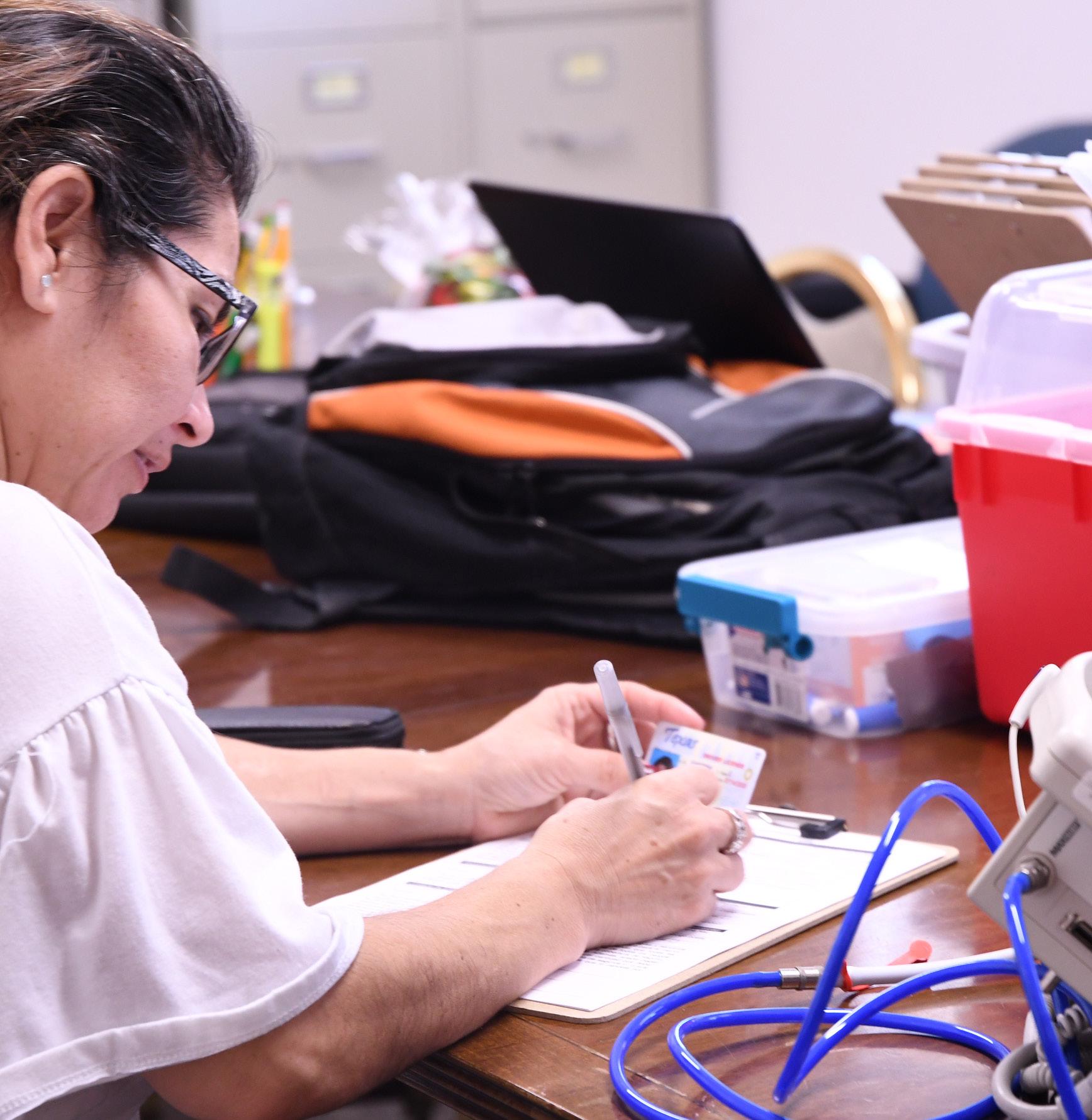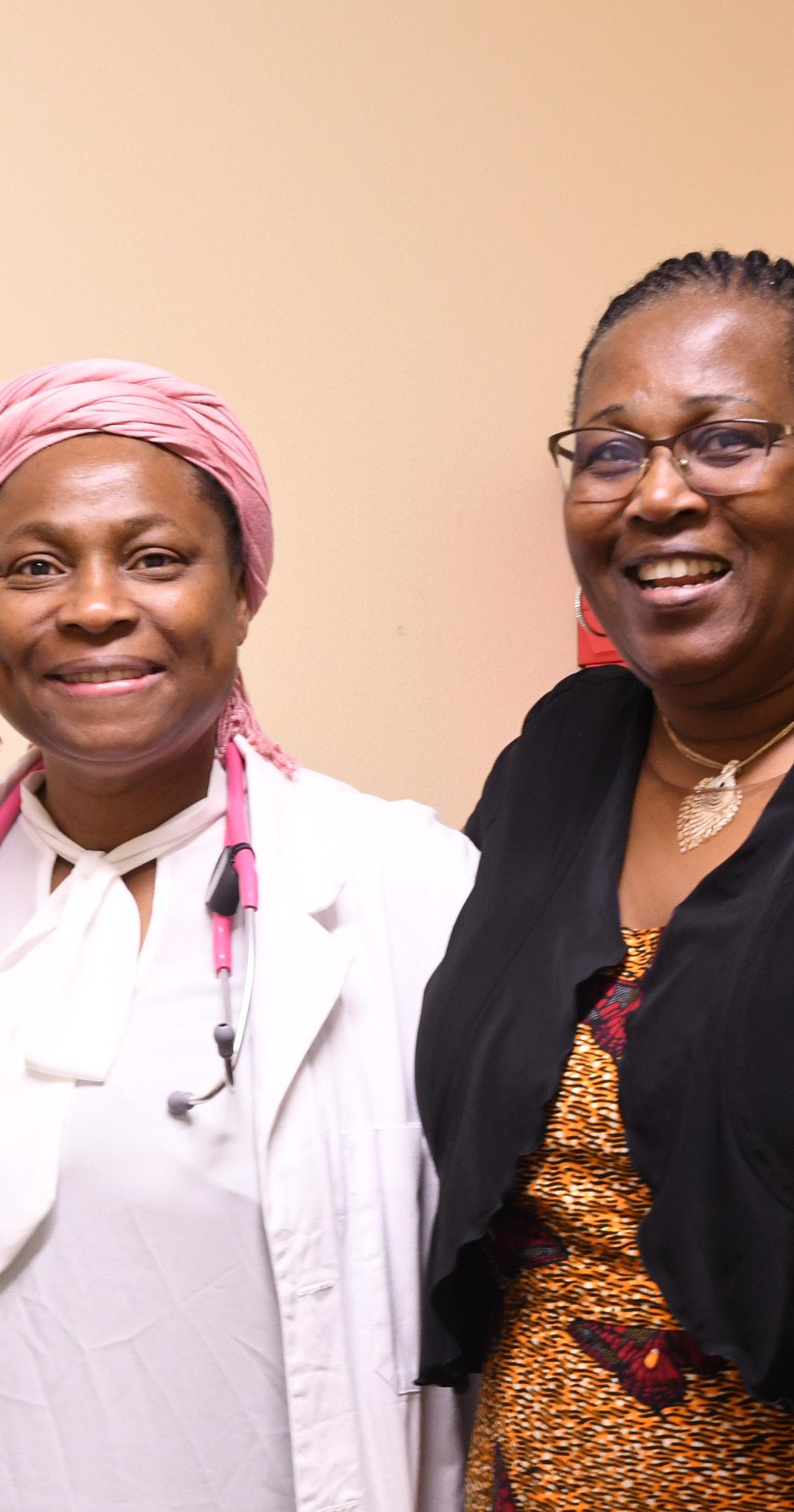
7 minute read
Ensuring access to healthcare
I am going to bring it recovery and healing; I will heal them and reveal to them abundance of prosperity and security.
Jeremiah 33:6
Advertisement
Ensuring Access to Healthcare
MANOR FREE CLINIC AIDS A COMMUNITY IN NEED
Manor Community Wellness Alliance is helping Northeast Austin residents become healthier.
The alliance is composed of local area residents, church leaders, Manor ISD staff, doctors, nurses, medical students and other health professionals, social workers and community leaders—all volunteers who make this happen. Although the free clinic is in its early stages, MCWA has a strong support group that is giving it momentum. Currently, the clinics take place at the former pre-K child development center at Oak Meadows Elementary School, 5600 Decker Lane in Austin.
MCWA was formed after the Rev. Alex Montes-Vela, vicar of Saint Mary Magdalene, Manor, got involved in congregational discernment workshops offered by the Diocese of Texas, Episcopal Health Foundation and others. In October 2018, Montes-Vela and a missional team of the church found out about the dire need for free access to healthcare in Manor after participating at the National Night Out—an event organized by the Manor Police Department.
There, they handed out a survey entitled, "What Does Manor Need?" in English and in Spanish, "¿Qué Necesita Manor?" The survey responses were tallied, and the results showed that access to doctors was by far the greatest need, followed by healthier food and safe places for physical activities. Ever since, Mark Longley, founder of the Saint Mary Magdalene missional team and now project manager of the clinic, and with Manor physician Dr. Karen Smith, co-founder of the clinic, meet every month with people in the community to discuss how they can further assist the community's health needs.
In 2020, MCWA, held a free clinic on January 18, and plans to hold additional ones on April 18, July 18, and October 17—the third Saturday of each of those months. In the future, MCWA hopes to hold the clinic monthly and then weekly. Other future plans include offering mental health first aid, community health worker certification, Spanish language classes focused on health care, and medical interpreter certification. The training will be free as a perk for volunteering.
PRECINCT 2 CHURCH SEEKS FUNDING TO OPEN A MULTISERVICE CENTER TO ALLEVIATE HEALTH NEEDS
by Paulette E. Martin
When the Rev. Ed Gomez accepted the call as vicar of St. Paul’s/San Pablo, Houston, he had never imagined the lack of resources his Gulfgate community was in dire need of. Located just a few miles north of Hobby Airport in Houston’s Precinct 2, his church is in one of the most under-performing and under-resourced areas in Harris County in terms of available and accessible healthcare, education programs, job development, youth programs, and behavioral mental health programs. St. Paul’s mission is simple: “We serve because everyone belongs.” In accordance with that statement, a few months ago, Gomez partnered with Crossroads at Park Place, converting the church into a safe haven where the homeless community can come to have lunch, shower, wash clothes and get haircuts, with the goal of restoring their dignity. As Gomez and Crossroads at Park Place got to know the homeless community, they soon realized another hurdle they faced. “We learned about the need for access to healthcare,” said Gomez. “So, we provided these individuals a list of places they could go to seek medical attention and we ultimately got the same response: ‘No, we can’t really go there’ or ‘I’m not welcome there.’” With that in mind, Gomez initiated his most ambitious plan yet: to expand the church's ministry services into a comprehensive, multi-service center for Precinct 2. Right now, the clinic, which consists of a few rooms in the parish hall, is open two days a week, allowing people to receive medical check-ups given by a staff family nurse-practitioner. “We realized that we really needed to have a culturally competent health care facility that was really affordable. We don’t require anyone to pay. If they can, it is a $20 visit, and if they do have insurance, we do take it,” said Gomez. The clinic came into realization through the partnership Gomez made with the Executive Director of UHPHealth, Bernice Koko. Koko has been a pioneer in providing health services for little to no cost throughout different parts of Harris County since 2016, including at St. John the Divine and St. Martin’s, both in Houston. Koko felt it was imperative to expand and offer health services at St. Paul’s after seeing with her own eyes the high rate of homelessness in the area. “After Father Ed invited me, and I came to visit and saw what I saw, I knew I had to help,” said Koko with tears welling up in her eyes. Aside from the homeless community, the clinic has also seen an influx of seniors and children. Gomez describes most parents whose kids have CHIP as being too scared to take their children to the doctor because of the current political atmosphere. According to Joy Ebomwonyi, the on-site nurse, most of her patients suffer from diabetes, high blood pressure, cholesterol, anxiety and depression. “We just want to make sure their hearts, their



kidneys, thyroid and hemoglobin are within limit,” said Ebomwonyi. Although Ebomwonyi relies on blood analysis as a health indicator, the wait for results is often prolonged because the blood samples must be sent to a laboratory. She hopes one day the clinic can have the resources to analyze the bloodwork onsite. St. Paul’s/San Pablo is currently seeking an initial investment of $2.1 million dollars to get the expansion project off the ground. In addition, they are seeking equal funding from each of three parties, Harris County, Harris Health, and the Great Commission Foundation of the Episcopal Church to help bring more volunteers, medical supplies and financial assistance to run the operation. “We’ve discovered that most patients have chronic diseases they need to manage and a place to access a doctor when needed. They don’t have transportation, so we need to come to them,” said Koko.
Rosamaria Murillo, Ph.D. recently-appointed Executive Director, El Buen Samaritano, a nonprofit and outreach ministry of the Episcopal Diocese of Texas.

New Leadership at El Buen Encompasses Further Strengthening Families
El Buen Samaritano, a non-profit and outreach ministry of the Episcopal Diocese of Texas, welcomed Rosamaria Murillo, Ph.D., as its Executive Director on July 15, 2019. Murillo is a recognized public health advocate who has vast experience in public policy, higher education, and nonprofit and government management. Murillo oversees a 30-year-old organization that builds healthy, resilient and vibrant communities by offering high-quality and affordable education, food assistance and spiritual support to families and individuals who live in poverty. In 2018-2019, El Buen Samaritano provided care to 5,662 patients— attending to over 17,500 medical visits and 643 behavioral health visits. 850 adults and youth benefitted from educational programs, and over 4,300 individuals received food and nutrition assistance. On June 6, 2019, El Buen Samaritano announced its collaboration with Lone Star Circle of Care to create new opportunities to improve access to affordable, high-quality healthcare in Austin. During their annual Hands for Hope campaign, El Buen Samaritano, along with the help of volunteers, Episcopal schools, church partners and the local community fed nearly 1,000 families during Thanksgiving.
El Buen Samaritano hopes to further extend a helping hand to more families and individuals in 2020. To learn more, visit elbuen.org.
St. Martin’s Transforms Access to Mental Healthcare Mental health is one of the most overlooked aspects of modern healthcare, yet it affects every one of us. And for those in need of higher levels of care, the costs can be prohibitive. St. Martin’s, Houston, created in 2012 a transformative new approach to ministry and mental health. Their initiative, called the Hope and Healing Center and Institute (HHCI), provides evaluation and treatment services to the community at no cost. The HHCI didn’t stop there. They have now also launched nation-wide training programs for churches to learn from their experiences. At the intersection of ministry and healthcare, clients are invited to talk, not only about their mental health, but also about their spiritual health. As of 2019, the HHCI has grown to serve a whopping 800 people a week, gratis.










